仁爱英语七年级下册知识点总结计划打印版.docx
仁爱版七年级(下册)知识点要点总结

仁爱版七年级(下册)知识点要点总结本学期研究的知识点包括:
语文
- 形音义的关系
- 修辞手法的运用
- 古诗文的鉴赏
- 现代文阅读与写作
数学
- 相反数与绝对值
- 分数加减乘除
- 二次根式与平方根
- 整式的加减乘除
英语
- 现在进行时
- 祈使句
- 简单过去式
- 数词与日期
历史
- 秦汉和尚书制的改革- 西汉时期的政治和军事- 东汉时期的政治和文化- 三国时期的政治和文化
生物
- 细胞的基本结构和功能- 生物多样性的认识
- 植物的结构和生长
- 动物的体内环境和调节
地理
- 中国的地理位置和自然地理条件
- 中国的人口与经济
- 中国的交通和旅游
- 国际热点问题的认知
政治
- 报告的主要内容
- 中国特色社会主义的本质特征
- 社会主义核心价值观的内涵与精神实质
- 当前的国际形势和中国与世界的关系
以上是本学期主要的知识点汇总。
在学习各科知识的同时,要
注意拓展视野、强化思维训练,努力提高语言表达能力、计算能力、探究能力和综合应用能力。
(完整版)仁爱版七年级英语下册知识点总结
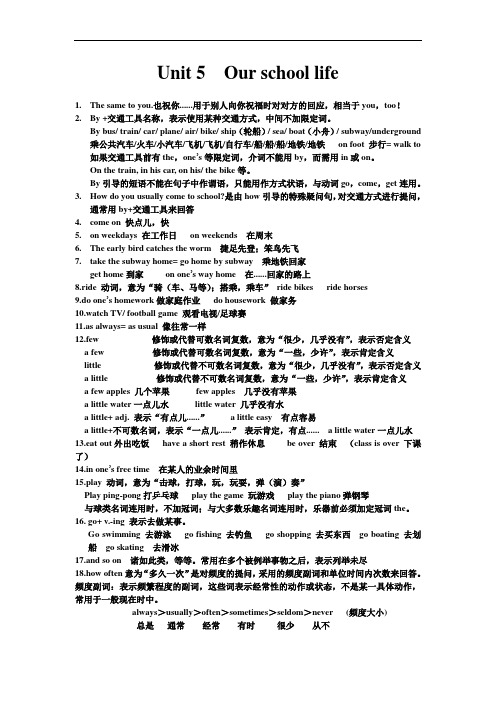
Unit 5 Our school life1.The same to you.也祝你......用于别人向你祝福时对对方的回应,相当于you,too!2.By +交通工具名称,表示使用某种交通方式,中间不加限定词。
By bus/ train/ car/ plane/ air/ bike/ ship(轮船)/ sea/ boat(小舟)/ subway/underground 乘公共汽车/火车/小汽车/飞机/飞机/自行车/船/船/船/地铁/地铁on foot 步行= walk to 如果交通工具前有the,one’s等限定词,介词不能用by,而需用in或on。
On the train, in his car, on his/ the bike等。
By引导的短语不能在句子中作谓语,只能用作方式状语,与动词go,come,get连用。
3.How do you usually come to school?是由how引导的特殊疑问句,对交通方式进行提问,通常用by+交通工具来回答e on 快点儿,快5.on weekdays 在工作日on weekends 在周末6.The early bird catches the worm 捷足先登;笨鸟先飞7.take the subway home= go home by subway 乘地铁回家get home到家on one’s way home 在......回家的路上8.ride 动词,意为“骑(车、马等);搭乘,乘车”ride bikes ride horses9.do one’s homework做家庭作业do housework 做家务10.watch TV/ football game 观看电视/足球赛11.as always= as usual 像往常一样12.few 修饰或代替可数名词复数,意为“很少,几乎没有”,表示否定含义a few 修饰或代替可数名词复数,意为“一些,少许”,表示肯定含义little 修饰或代替不可数名词复数,意为“很少,几乎没有”,表示否定含义a little 修饰或代替不可数名词复数,意为“一些,少许”,表示肯定含义a few apples 几个苹果few apples 几乎没有苹果a little water一点儿水little water 几乎没有水a little+ adj. 表示“有点儿......” a little easy 有点容易a little+不可数名词,表示“一点儿......”表示肯定,有点...... a little water一点儿水13.eat out外出吃饭have a short rest 稍作休息be over 结束(class is over 下课了)14.in one’s free time 在某人的业余时间里15.play 动词,意为“击球,打球,玩,玩耍,弹(演)奏”Play ping-pong打乒乓球play the game 玩游戏play the piano弹钢琴与球类名词连用时,不加冠词;与大多数乐趣名词连用时,乐器前必须加定冠词the。
(完整)仁爱版英语七年级下全部知识点总结,推荐文档

七年级下英语知识点总结Unit 5 Topic1㈠短语总结1.在学校大门口at the school gate2.来学校come to school3.去学校go to school4.上课have class / have classes5.步行on foot6.骑自行车ride a bike/ ride bikes/ by bike / ona bike7.坐公交by bus / take a bus8.坐地铁by subway / take the subway / onthe subway9.坐飞机by plane/ take the plane / on theplane10.坐小汽车by car / in a car/ take a car/ drive acar11.坐轮船by ship12.坐小船by boat13.坐火车by train / on the train14.在我们组in our group15.一群学生 a group of students16.我们中的三个人three of us17.在平日on weekdays18.在周末on the weekends / at weekends19.起床get up20.睡觉go to bed21.早起get up early22.回家go home23.到家get home24.去动物园go to the zoo25.去公园go to the park26.看电影see a movie / film27.看电视watch TV28.在晚上in the evening / at night29.帮助父母help parents30.做某人的家庭作业do one’s ( my/ her/ his/your/ their)homework31.在学校at school㈡重要句型1. I usually come to school by subway.同义句: I usually take the subway to school.对划线部分提问: How do you usually come to school? 32.知道,了解know about / learn about33.校园生活school life34.一个美国学生an American student35.在美国in America / in the U.S.A.36.许多学生many students/ a lot of students/ lotsof students37.很少very few38.吃午饭have lunch39.出去吃饭eat out40.在校期间on school days41.休息一会have a short rest/ break42.午饭后after lunch43.在某人的业余时间in one’s( my/ his/ her/their…)free/ spare time44.打篮球play basketball45.踢足球play soccer / football46.弹钢琴play the piano47.弹吉他play the guitar48.拉二胡play erhu49.去游泳go swimming / go for a swim50.去划船go boating51.球赛a ball game / ball games52.一年四次four times a year53.听音乐listen to music54.读书read books55.看报read newspapers56.看医生see a doctor57.去图书馆go to the library58.一周两次twice a week59.见朋友meet friends60.每天every day61.在七点半at half past seven62.一小会for a little while / for a short time63.晚饭后after supper64.吃饭have dinner65.吃早饭have breakfastgo to school by bike=go to schoolon a bike= ride a bike to school=ride to schoolgo home by bus=go home on a bus=take a bus home2.How do you usually/ often…?你通常/经常怎样…?3.It’s time for class.=It’s time to have class. =It’stime for having class.4.What about you? =How about you?5.How often …?询问频率,回答可以用频率副词:always, usually, often, sometimes, seldom, never, every day ,every +其他时间名词或表示频率的短语回答表示频率的短语:次数+单位时间e.g. : once a day / twice a week / three times a month6.The early bird catches the work. (谚语) 笨鸟先飞7.Work / Study must come first. 工作/ 学习必须放在第一位!8.Classes begin at eight. =Class begins at eight.提问:What time does the class begin? / What time do the classes begin?㈢重要单词的用法1. look (感官动词) 看起来,后面加形容词His mother looks very young.They look very cute.Her dress looks very nice.You look very cool in this coat.1.You new watch (look) very nice!2.Here (be) some news.3.Oh, come on! It’s time going to school.4.They usually go to school on (feet).5.In my class, forty of (we) go to schoolby bike. 2.by 介词by 后面直接加表示交通工具的名词,中间不用任何词修饰,如:by bikeby +动词ing 形式,表示通过某种方式People show love to their mothers by giving cards.You can be a good student by working hard. 3.over ( 形容词)School / Class is over.4.begin现在分词: beginning 过去式: beganbegin to do sth , begin doing sthHe begins to write a letter. =He begins writing a letter.如果begin 本身为分词,只能用begin to do sthHe is beginning to run.5.listen to 听(动作),hear 听见(结果)6.always 反义词never7.本话题涉及的时态为一般现在时,句中常有频率副词或表示频率的短语,如果主语为三单,动词一定要用三单!(四)易错题us.A. is alwaysB. seldom isC. always isD. often is19.The last class (finish) at twelve o’clock.20.Let’s go (boat).21.It’s time to have breakfast. (同义句)6.The early bird (catch) the worm.7.Kangkang often (ride) a bike to the park. .8.What time (be)school over? 22. Michael often rides a bike to school. (同义句)9.Work must come (once).10.It’s time you to get up.11.We often books in the morning..23. I always go to work on foot. (对划线部分提问)12.Jill’s friend like (study) in our school.13.Mr. Wang teaches (we) English. .of us like him.14.How about (go) out with me? 24.My mother goes shopping twice a week. ( 对划线部分提问)15.Most students go to school the school bus.16.do you go shopping with your mother?A. How soonB. How farC. How oftenD. How much.25.Mary always reads books in the library. (反义句)17.What time do you usually get up .weekdays?18.He busy, so he has no time to play with 26.He usually does his homework at school. (否定句).27.They often go to school by bus in the morning.(对划线部分提问)(一) 重要单词:Unit5 Topic2.28.Jane seldom watches TV on weekdays. (改为一般疑问句).29.He usually has lunch at home. (对划线部分提问).30.Li Ping often goes to work on foot. (同义句).31.几乎没有学生乘地铁去学校。
(完整版)仁爱版七年级英语下册知识点总结
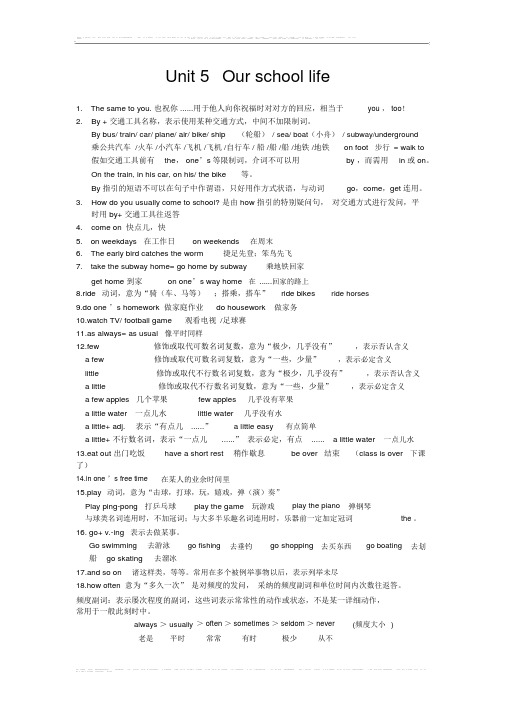
the principl e o plifie d IA of constr ucti on pr ojec ts i n th e r egi on. In ter ms of land, linke d to the i m plem entation of ur ban a nd r ural c onstr ucti n land i ncreas e a nd decreas e, repla cem ent i ndi c ators for pri ority areas proje ct. Cha rges, int o the pr oje cts of water, ele ctricit y, a dm nistrati e charge and ref er ential poli cie s. I n th e a eappoi nt a f ull of taxati on, and s ettled i n areas of i ndus and its produc tio n c ompany, wi thi n 5 ea aft r t he ple tion of cal ines se s i n thince nti es to e nter prises. In ter ms of financing, isuentegration of l and, tax, fina ncial a nd other resour ces, a nd constr uct "Gov er nme nt cr edi t +nes s credit" cre dit s ystem, establi shm en of mar etization, commercializ ati on a nd m oder nization of the i nv stment and financing platfor m; effecti ve Ba nk-enter pris doc ng, enc ourage pri at e ca pital into t he Par, to rais e industr development fund. 5,optimiz e the env ironment a nd ce i ndu ies. T o ate oli lands, Hig hlands, i ntegrity of s er ice land, devel opme nt l and" as t he goal, tthe area under development env onme nt. All admini strati ve l aw enforc ement de partments to a-time pers onnel stati one d in ar eas dedi cated to coor dinati ng and s ol ing pr oble ssoci ated with busi When ther e are s ubstantial i s, s e c tor l ea ders arr ange d to pers onal ly nter ene, i-pe on, i n-pe son pus h tangi ble area din g a ee n lig ht, ea ne. o fur ther reduce a nd sta ndar ze admi nistr ati ve exami nation a nd appr oval items, si mplify exami nati on and appro val li s, i ve ef cie ding to t he ...Sinc e the educ ati onal prac ti c e of the mas s li ne of the pa rty,himself s eri ousl y i n the e duc ati on, prac cal c ontrol central "eight r ules" and opposi ng "the four wi nds" and prac cing "three S uns", and che k the spirit of Jiao Yul u, ideol og y, olicit opi nions based on outsta ndi ng pr obl ems c he cked swi ng, ca reful a nal si s and refl ction.Will now che ck report i s as follow s: fi st, adh er nce to he pa y's politi cal discipli ne, e ight in the ce ntral pr ov isi on, ch nge the yle of t he ba sic sit uation of 1, in com plian ce with t he party's politi cal discipli nes.Cons cienti ousl y a bide b y t he party's politic al pline abi de by the Consti tuti nd e rul s a nd reg ulati ons of the n the politic al, i de ologi c al and maintai n highly consiste nt with the CPC C e ntral C ommittee on the ac on, ther e is no v iol ationprimar firs t-hand an i nade quate gras p of the pro bl e whi ch is t o be stre ngthe ned in t he futur e. Sec ond, constr ucti on, stric n a or d an e wit h t he pr ov sions to s treamli ne and i mpr ov e t he quali ty of meetings of the C onfer ence. T hird, streamlini ng file bri efs,cult ure i nvol s all as pec ts of propaganda a nd ideol ogy, s ometi mes due to the prac cal ne ds of invention notific ati ons, thi s area nee furt herUnit 5 Our school life1. The same to you. 也祝你 ......用于他人向你祝福时对对方的回应,相当于you , too!2.By + 交通工具名称,表示使用某种交通方式,中间不加限制词。
(仁爱版)英语七下各单元知识点归纳.doc

英语七卑怨下册各单无応识点归他Unit 5 Topicl重点语法一般现在时(常与频度副词never, seldom, sometimes, often,usually,always等连用)重点句型一How do you usually come to school?一I usually come to school by subway.一How often do you go to the library?一Once/Twice/Three times a week/Very often/Every day/Sedom重点详解1.1 always come to school by bus.by+交通工具名称,表示使用某种交通方式,中间不加限定词,如果交通工具前有a, the, my等限定词,就不能用by,而是用in或是on.on the train=by train on his bike=by bike in my car=by car.巧辩异同on foot与walk on foot "走路",是介词短语,不能作谓语,只作方式状语,位于句末。
walk“走路”,是动词,可以作谓语。
go to...on foot= walk to I often go to school on foot. =1 often walk to school.同样,go to....by bike = ride a bike to go to.... by car = drive a car togo to ... by plane = fly to go to... by bus = take a bus toe on! Ifs time for class. come on "快点,加油,来吧"。
It's time for sth."该做某事了",与It's time to do sth.意思一样。
(完整版)仁爱英语七年级下册重要知识点和语法点归纳,推荐文档

Unit 5 Our School Lifetopic1How do you go to school?一、重点词语:1. wake up醒来,唤醒get up起床2. go to school去上学go home 回家3. go dancing / shopping / skating / swimming去跳舞;购物、滑冰;游泳go doing something可用于表达去进行某种娱乐休闲活动。
4.表示交通方式:on foot步行by boat坐船by ship坐船by air乘飞机by plane乘飞机by train坐火车by subway搭乘地铁by car坐小汽车by bus坐公共汽车by bike骑自行车5. take the subway / bus / car搭乘地铁;公共汽车;小汽车6. drive a car to work = go to work by car驾车去上班take a bus to work = go to work by bus乘公共汽车去上班go to school on foot = walk to school步行去上学7. ride a bike / horse骑自行车;骑马8. after school / class放学以后;下课以后9. play the piano / guitar / violin弹钢琴;吉他;小提琴play basketball / soccer / football打篮球;踢足球;打橄榄球play computer games玩电脑游戏play with a computer玩电脑play sports做运动10. next to紧挨着,在⋯旁边11. a plan of my school一幅我们学校的平面图12. on weekdays在工作日at weekends在周末13. have breakfast / lunch / supper / dinner / meals吃早餐;中餐;晚餐;正餐;一日三餐have classes / lessons / a meeting上课;上课;开会14. watch TV / movies / games / the animals看电视;电影;比赛;动物read novels / newspapers / books看小说;报纸;书15. wash one ’s face / clothes洗脸;衣服16. 反义词: up – down, early– late近义词:quickly– fastget up early早起be late for迟到17. the first / second / third / fourth day第一;二;三;四天18. clean the house打扫房子19.表示建筑物(尤其学校建筑物):on the playground在操场at school / home / table在学校;家里;桌旁in a computer room / teachers’ office / classroom building / gym / library / lab / canteen在电脑室;教师办公室;教学楼;体操馆;图书馆;实验室;食堂20. around six o’clock = at about six o’clock大约在六点21. 频率副词: never, seldom, sometimes, often, usually, always二、重点句型:1.It’s time to get up.该起床的时候了。
仁爱版英语七年级下册知识点归纳(完整版)

仁爱版英语七年级下册知识点归纳(完整版)-CAL-FENGHAI-(2020YEAR-YICAI)_JINGBIAN仁爱版英语七年级下册知识点归纳?英语七年级下册知识点归纳Unit?5?Topic1?重点语法一般现在时(常与频度副词never,?seldom,?sometimes,?often ,usually,?always等连用)重点句型?—How?do?you?usually?come?to?school???—I?usually?come?to?school?by?subway.????????????—How?often?do?you?go?to?the?library????—Once/Twice/Three?times?a?week/Very?often/Every?day/Seldom重点详解1I?always?come?to?school?by?bus.???by+交通工具名称,表示使用某种交通方式,中间不加限定词,如果交通工具前有a,?the,?my?等限定词,就不能用by,而是用in或是on.???on?the?train=by?train???on?his?bike=by?bike???in?my?car=by?car.???巧辩异同on?foot?与?walk????on?foot?“走路”,是介词短语,不能作谓语,只作方式状语,位于句末。
??walk?“走路”,是动词,可以作谓语。
? ? ??go?to…on?foot=?walk?to? ? ???I?often?go?to?school?on?foot.?=I?often?walk?to?school.?????同样,go?to….by?bike?=?ride?a?bike?to?????? ? ? ? ? go?to….?by?car?=?drive?a?car?to????????? ??go?to?…?by?plane?=?fly?to????????? ? ? ? ? go?to…?by?bus?=?take?a?bus?to2???Come?on!?It’s?time?for?class.???????come?on?“快点,加油,来吧”。
(完整版)仁爱版英语七年级下册知识点归纳(完整版)
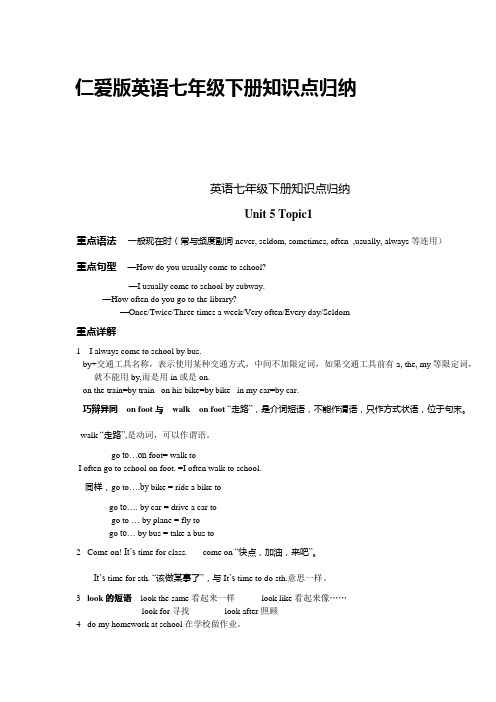
仁爱版英语七年级下册知识点归纳英语七年级下册知识点归纳Unit 5 Topic1重点语法一般现在时(常与频度副词never, seldom, sometimes, often ,usually, always等连用)重点句型—How do you usually come to school?—I usually come to school by subway.—How often do you go to the library?—Once/Twice/Three times a week/Very often/Every day/Seldom重点详解1I always come to school by bus.by+交通工具名称,表示使用某种交通方式,中间不加限定词,如果交通工具前有a, the, my 等限定词,就不能用by,而是用in或是on.on the train=by train on his bike=by bike in my car=by car.巧辩异同on foot 与walk on foot “走路”,是介词短语,不能作谓语,只作方式状语,位于句末。
walk “走路”,是动词,可以作谓语。
go to…on foot= walk toI often go to school on foot. =I often walk to school.同样,go to….by bike = ride a bike togo to…. by car = drive a car togo to … by plane = fly togo to… by bus = take a bus to2 Come on! It’s time for class. come on “快点,加油,来吧”。
It’s time for sth. “该做某事了”,与 It’s time to do sth.意思一样。
仁爱英语七年级下册知识点归纳总结

仁爱英语七年级下册知识点归纳总结那咱们开始!一、词汇。
1. 好多好多新单词等你认识呢,像“postcard”(明信片)、“hotel”(旅馆)、“bank”(银行),别弄混啦!2. 注意单词的词性哦,比如“swim”(动词:游泳),“swimming”(名词:游泳)。
3. 还有一些容易拼写错误的单词,像“favourite”(最喜欢的),可别少了字母“u”哟。
二、语法。
1. 一般现在时:这可是经常出现的“常客”,要注意主语是第三人称单数时动词的变化,比如“He likes apples.”(他喜欢苹果。
),“like”要加“s”。
2. 现在进行时:“be + doing”这个结构要记牢,“I'm reading a book.”(我正在读书。
),表示正在发生的动作。
3. 介词的用法:“in”“on”“at”可要分清,“in the morning”(在早上),“on the desk”(在桌子上),“at 8 o'clock”(在 8 点)。
三、句型。
1. 日常交际用语不能忘,比如“Nice to meet you.”(见到你很高兴。
),“How are you?”(你好吗?)2. 问路和指路的句型要学会,“Excuse me. Where is the post office?”(打扰一下,邮局在哪里?)“Go along this street and turn left.”(沿着这条街走然后左转。
)四、课文。
1. 多读课文,熟悉里面的句子和表达方式,这样才能更好地掌握知识点。
2. 注意课文中的语音语调,模仿着读,让你的英语更地道。
好啦,这就是仁爱英语七年级下册的主要知识点,加油学习,相信你一定能搞定!。
仁爱版七年级英语下全册重点知识归纳
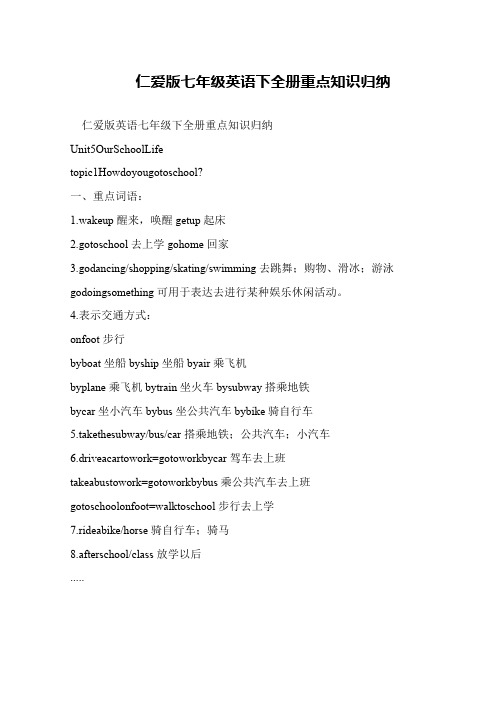
仁爱版英语七年级下全册重点知识归纳 Unit5OurSchoolLife topic1Howdoyougotoschool? 一、重点词语: 1.wakeup 醒来,唤醒 getup 起床 2.gotoschool 去上学 gohome 回家 3.godancing/shoppinห้องสมุดไป่ตู้/skating/swimming 去跳舞;购物、滑冰;游泳 godoingsomething 可用于表达去进行某种娱乐休闲活动。 4.表示交通方式: onfoot 步行 byboat 坐船 byship 坐船 byair 乘飞机 byplane 乘飞机 bytrain 坐火车 bysubway 搭乘地铁 bycar 坐小汽车 bybus 坐公共汽车 bybike 骑自行车 5.takethesubway/bus/car 搭乘地铁;公共汽车;小汽车 6.driveacartowork=gotoworkbycar 驾车去上班 takeabustowork=gotoworkbybus 乘公共汽车去上班 gotoschoolonfoot=walktoschool 步行去上学 7.rideabike/horse 骑自行车;骑马 8.afterschool/class 放学以后 .....
仁爱英语七年级下册知识点总结.doc
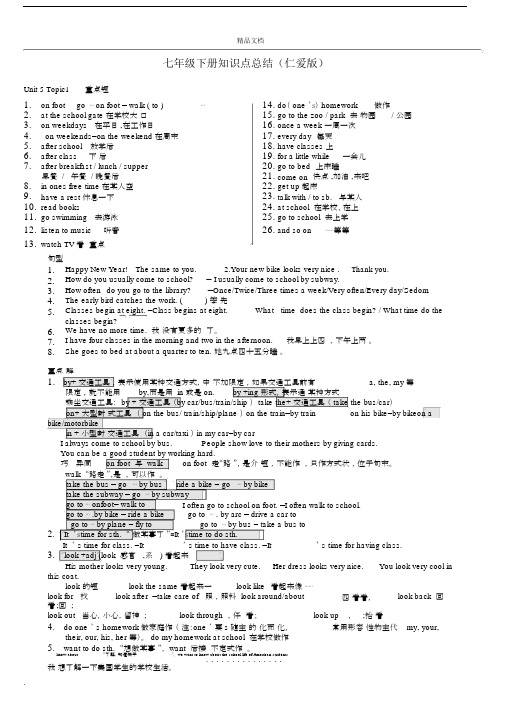
精品文档七年级下册知识点总结(仁爱版)Unit 5 Topic1 重点短1. on foot go ⋯ on foot = walk ( to ) ⋯14. do( one ’s) homework 做作2. at the school gate 在学校大口15. go to the zoo / park 去物园/ 公园3. on weekdays 在平日 ,在工作日16. once a week 一周一次4. on weekends=on the weekend 在周末17. every day 每天5. after school 放学后18. have classes 上6. after class 下后19. for a little while 一会儿7. after breakfast / lunch / supper 20. go to bed 上床睡8. 早餐 / 午餐 / 晚餐后21. come on 快点 ,加油 ,来吧in ones free time 在某人空22. get up 起床9. have a rest 休息一下23. talk with / to sb. 与某人10. read books 24. at school 在学校、在上11. go swimming 去游泳25. go to school 去上学12. listen to music 听音26. and so on ⋯⋯等等13.watch TV 看重点句型1.2.3.4.5. Happy New Year! The same to you. 2.Your new bike looks very nice .Thank you.How do you usually come to school?—I usually come to school by subway.How often do you go to the library?—Once/Twice/Three times a week/Very often/Every day/Sedom The early bird catches the work. () 笨先Classes begin at eight. =Class begins at eight.What time does the class begin? / What time do the classes begin?6.7.8. We have no more time. 我没有更多的了。
仁爱英语七年级的的下册的的知识点归纳.doc
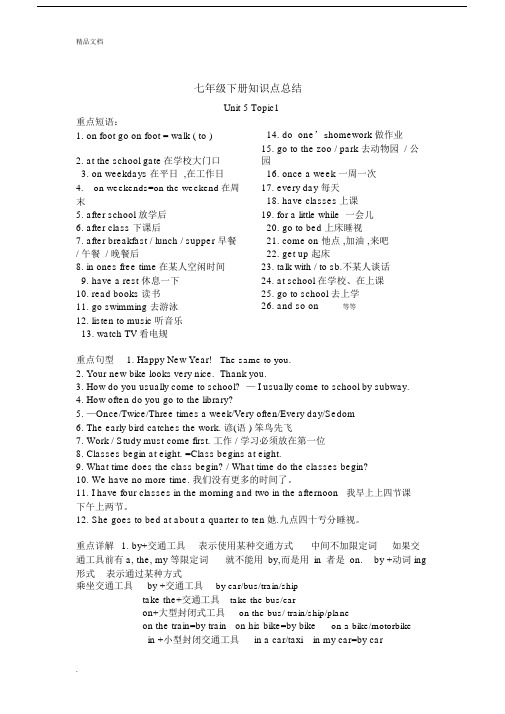
七年级下册知识点总结Unit 5 Topic1重点短语:1. on foot go on foot = walk ( to )2.at the school gate在学校大门口3.on weekdays 在平日 ,在工作日4.on weekends=on the weekend在周末5.after school 放学后6.after class 下课后7.after breakfast / lunch / supper 早餐/ 午餐 / 晚餐后8.in ones free time在某人空闲时间9.have a rest 休息一下10.read books 读书11.go swimming 去游泳12.listen to music 听音乐13.watch TV 看电规14.do one’s homework 做作业15.go to the zoo / park 去动物园 / 公园16.once a week 一周一次17.every day 每天18.have classes上课19.for a little while 一会儿20.go to bed 上床睡视e on 忚点 ,加油 ,来吧22.get up 起床23.talk with / to sb.不某人谈话24.at school 在学校、在上课25.go to school 去上学26. and so on等等重点句型 1. Happy New Year!The same to you.2.Your new bike looks very nice. Thank you.3.How do you usually come to school? — I usually come to school by subway.4.How often do you go to the library?5.—Once/Twice/Three times a week/Very often/Every day/Sedom6.The early bird catches the work. 谚(语 ) 笨鸟先飞7.Work / Study must come first. 工作 / 学习必须放在第一位8.Classes begin at eight. =Class begins at eight.9.What time does the class begin? / What time do the classes begin?10.We have no more time. 我们没有更多的时间了。
- 1、下载文档前请自行甄别文档内容的完整性,平台不提供额外的编辑、内容补充、找答案等附加服务。
- 2、"仅部分预览"的文档,不可在线预览部分如存在完整性等问题,可反馈申请退款(可完整预览的文档不适用该条件!)。
- 3、如文档侵犯您的权益,请联系客服反馈,我们会尽快为您处理(人工客服工作时间:9:00-18:30)。
七年下册知点Unit 5 Topic1重点短on foot go ⋯on foot = walk ( to )⋯do(one’s) homework做作at the school gate在学校大口go to the zoo / park去物园 /公园on weekdays在平日, 在工作日once a week 一周一次on weekends=on the weekend在周末every day每天after school放学后have classes上after class下后for a little while一会儿after breakfast / lunch / supper go to bed上床睡早餐 /午餐 /晚餐后come on快点,加油 ,来吧in ones free time在某人空get up 起床have a rest休息一下talk with / to sb.与某人read books at school在学校、在上go swimming去游泳go to school去上学listen to music听音and so on⋯⋯等等watch TV 看重点句型Happy New Year!The same to you.Your new bike looks very nice.Thank you.How do you usually come to school— I usually come to school by subway.How often do you go to the library— Once/Twice/Three times a week/Very often/Every day/SedomThe early bird catches the work. ()笨先Work / Study must come first.工作/学必放在第一位!Classes begin at eight. =Class begins at eight.What time does the class begin / What time do the classes beginWe have no more time.我没有更多的了。
I have four classes in the morning and two in the afternoon.我早上上四,下午上两。
She goes to bed at about a quarter to ten.她九点四十五分睡。
重点解by+交通工具,表示使用某种交通方式,中不加限定,如果交通工具前有a, the, my等限定,就不能用by, 而是用 in 或是 on. by +ing 形式,表示通某种方式乘坐交通工具:by + 交通工具( by car/bus/train/ship)take the+交通工具(take the bus/car)on+大型封式工具(on the bus/ train/ship/plane)on the train=by train on his bike=by bike on a bike/motorbikein +小型封交通工具(in a car/taxi)in my car=by carI always come to school by bus.People show love to their mothers by giving cards.You can be a good student by working hard.巧异同on foot与walk on foot“走路”,是介短,不能作,只作方式状,位于句末。
walk “走路” , 是,可以作。
take the bus = go⋯by bus ride a bike = go⋯by biketake the subway = go⋯by subwaygo to ⋯on foot= walk to I often go to school on foot. =I often walk to school.go to ⋯.by bike = ride a bike go to ⋯. by car = drive a car togo to⋯by plane = fly to go to ⋯ by bus = take a bus to2.It ’s time for sth.“ 做某事了” =It’s time to do sth.It ’s time for class. =It’s time to have class. =It’s time for having class.3. look +adj (look感官,系)看起来His mother looks very young.They look very cute.Her dress looks very nice. You look very cool in this coat.look 的短look the same看起来一look like看起来像⋯⋯look for找look after =take care of照,照料look around/about四看看,四下; look back回看;回;look out当心,小心,留神; look through,仔看;look up,;抬看4.do one ’s homework 做家庭作(注: one’s 要随主的化而化,常用形容性物主代 my, your, their, our, his, her等)。
do my homework at school在学校做作5. want to do sth.“想做某事”,want 后接不定式作。
know about “了解,知道关于⋯”。
we want to know about the school life of American students.我想了解一下美国学生的学校生活。
6.巧异同a few+可数名(肯定);一点,一些;few+可数名:(否定)很少, 几乎没有a little+不可数名(肯定);一点,一些;little +不可数名:(否定)很少, 几乎没有little和 few 作形容用,都表示“几乎没有”, 少 ; a little和a few有一些。
has a few friends.他有几个朋友。
He has few friends.他几乎没有朋友。
. I can speak only a little Chinese. They has little money.他没有什麽a little与little也可以用作副,表示“有点”“稍稍”表示“很少”. Can you speak English ---Yes, but only a little.This book is a little more difficult than that one.(可修形容比)She slept little last night.昨天晚上,她没有怎么睡。
7. go+表示去做某事,似:go fishing去go shopping去西go boating去划船go skating去滑冰go swimming去游泳and so on“等等”,表示有很多。
They often play basketball or coccer, go swimming and so on.(1). How often多久一次(度行提)答常用度副always> usually>often> sometimes>seldom>never等或位内的次数表示率的短:次数+位. : once a week一周一次 twice a month每月两次 three times a year每年三次How often do you go to the library你多久去一次--once/twice/three times/four times a week/month/year(2).How far多(表示距离) How far is it from here to the zoo-- It ’s 6 kilometers.(3).How long多(行提 / 西的度)How long did he stay here About two weeks.How long is the river About 500 km.(4).How soon 再多久,主要用来表示将来一段的提。
How soon will he be back In an hour.9.over (形容 )School / Class is over.10.begin在分 : beginning去式 : began begin to do sth begin doing sthHe begins to write a letter. =He begins writing a letter.如果 begin本身分,只能用 begin to do sth He is beginning to run.11.listen to听(作), hear听(果)冠用法1.器前要定冠the, 而行球运不the 。
play + 棋 / 球 / 牌下⋯⋯棋,打⋯⋯球play soccer/basketballplay the +西洋器/ 拉⋯⋯器play the guitar/piano2. 序数,前面要用定冠the 。
on the second floor3. 三餐前面不用冠。
have breakfast/lunch/supper一般在法解一般在表示:(常与度副never,seldom, sometimes, often,usually,always 等用)( 1)在所的状。
Jane is at school.( 2)常或性的作。
I often go to school by bus.( 3)主具的性格和能力。
He likes playing football.(4)客真理。
The earth goes round the sun.常用的状:often, always, usually, sometimes, every day等等。
行的一般在,助是do/don ’t和 does/doesn ’t. 当主是第一、二人称和所有复数形式,行用原形。
肯定式: I go to school on foot.否定式:I don’t go to school on foot.疑式: Do you go to school on foot—Yes, I do.—No, I don’t.当主是第三人称数,用第三人称数形式,在尾加-s 或 -es 。
